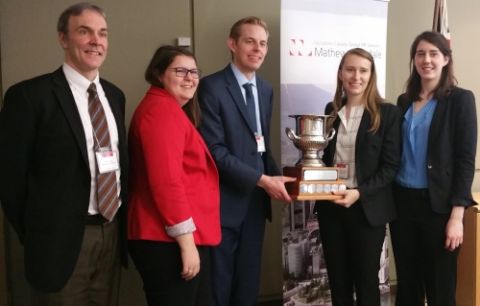
A team of Queen’s Law students is back from Toronto with a new trophy after winning the Mathews Dinsdale National Labour Arbitration Moot.
Advocates Stephanie McLoughlin and Geoff Tadema, both Law’18, presented their case before Supreme Court justice Clément Gascon, Canada Industrial Relations Board chair Ginette Brazeau, Ontario Labour Relations Board chair Bernard Fishbein. They were assisted with research and analysis from Natalie Garvin, Law’17, and student coach Mary Hayhow, Law’17.
The moot, now in its 19th year, was held at the Ontario Labour Relations Board from January 27–29. Eight law schools from across the country participated. Queen’s faced off against Western in the final.
“I would describe it as a very long sprint,” says McLoughlin. “It’s like an 800-metre race.”
Tadema calls it “an intense but really rewarding process.”
The moot problem centred on grievances dealing with representation rights and discipline for misconduct and for an employee who had resigned.
“The early days require getting familiar with the facts and doing research in support of the issues raised,” says Tadema. “This was followed by preparing arguments and multiple practice rounds where we received feedback from practitioners.
“After all the preparation,” he adds, “you know both sides inside out and the fun part comes to follow through at the moot.”
The Queen’s team had to argue both sides in this moot.
“Arbitration is more collegial and casual,” McLoughlin says. “You’re sitting down. The arbitrators aren’t wearing robes, we aren’t wearing robes. You don’t bow or anything.
While she says “it consumed my January,” the chance to moot in front of a sitting Supreme Court justice was “surreal.”
Both advocates encourage students to try out for Mathews Dinsdale moot next year. “It’s a chance to align legally relevant analysis with presentation skills,” Tadema says. “There are so many different styles and personalities that can allow someone to be an effective advocate. The biggest skill I developed was being ready to think on my feet and respond to questions of panelists.”
McLoughlin says the toughest questions came from Fishbein, who took issue with the estoppel part of her argument. Coach and labour law professor Kevin Banks highlighted the team’s “poise, eloquence and adaptability in the face of challenging questions.”
Ultimately, their persuasive analysis swayed the judges and when the dust settled, the Queen’s team stood above the rest as national champions.
By Jeremy Mutton